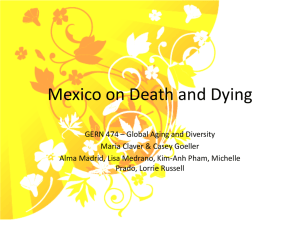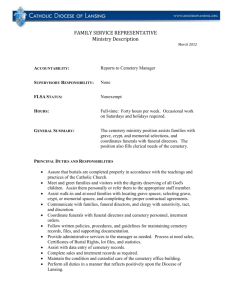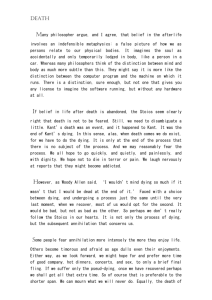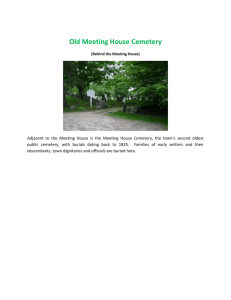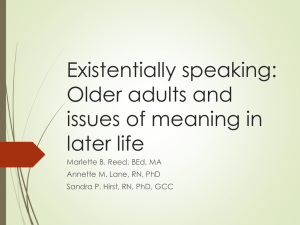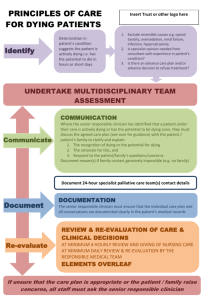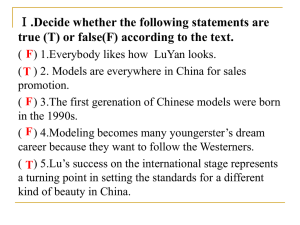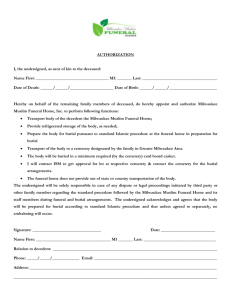RELG301: Death and Dying
advertisement
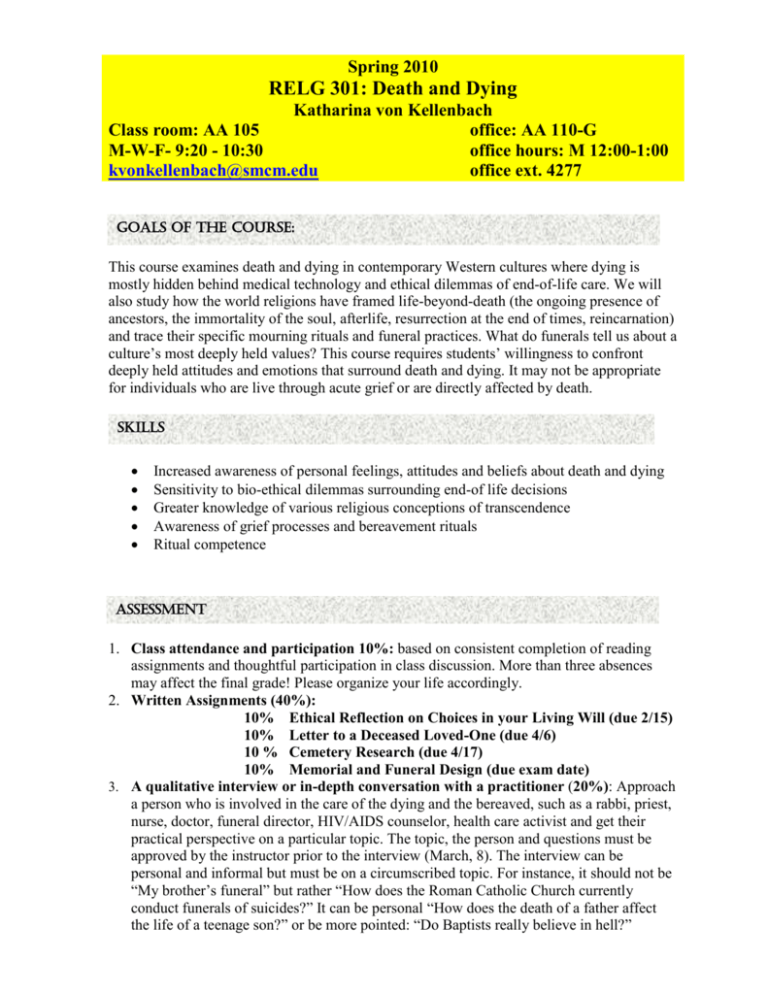
Spring 2010 RELG 301: Death and Dying Katharina von Kellenbach Class room: AA 105 office: AA 110-G M-W-F- 9:20 - 10:30 office hours: M 12:00-1:00 kvonkellenbach@smcm.edu office ext. 4277 Goals of the Course: This course examines death and dying in contemporary Western cultures where dying is mostly hidden behind medical technology and ethical dilemmas of end-of-life care. We will also study how the world religions have framed life-beyond-death (the ongoing presence of ancestors, the immortality of the soul, afterlife, resurrection at the end of times, reincarnation) and trace their specific mourning rituals and funeral practices. What do funerals tell us about a culture’s most deeply held values? This course requires students’ willingness to confront deeply held attitudes and emotions that surround death and dying. It may not be appropriate for individuals who are live through acute grief or are directly affected by death. Skills Increased awareness of personal feelings, attitudes and beliefs about death and dying Sensitivity to bio-ethical dilemmas surrounding end-of life decisions Greater knowledge of various religious conceptions of transcendence Awareness of grief processes and bereavement rituals Ritual competence Assessment Requirements: 1. Class attendance and participation 10%: based on consistent completion of reading assignments and thoughtful participation in class discussion. More than three absences may affect the final grade! Please organize your life accordingly. 2. Written Assignments (40%): 10% Ethical Reflection on Choices in your Living Will (due 2/15) 10% Letter to a Deceased Loved-One (due 4/6) 10 % Cemetery Research (due 4/17) 10% Memorial and Funeral Design (due exam date) 3. A qualitative interview or in-depth conversation with a practitioner (20%): Approach a person who is involved in the care of the dying and the bereaved, such as a rabbi, priest, nurse, doctor, funeral director, HIV/AIDS counselor, health care activist and get their practical perspective on a particular topic. The topic, the person and questions must be approved by the instructor prior to the interview (March, 8). The interview can be personal and informal but must be on a circumscribed topic. For instance, it should not be “My brother’s funeral” but rather “How does the Roman Catholic Church currently conduct funerals of suicides?” It can be personal “How does the death of a father affect the life of a teenage son?” or be more pointed: “Do Baptists really believe in hell?” 4. Final Essay (30%) designed to facilitate reflection and integration of the information gleaned from assigned readings, in-class presentations and class discussions. Assigned Readings Leo Tolstoy, The Death of Ivan Illich, New York: Penguin Classics, 2008 Maggie Callanan and Patricia Kelley, Final Gifts: Understanding the Special Awareness, Needs and Communications of the Dying, New York: Bantam Book, 1992 Rimpoche, The Tibetan Book of the Dead, New York: Bantam Books, 1993 Hiroshi Obayashi, Death and Afterlife: Perspectives of World Religions, New York: Praeger, 1992 Colin Murray Parkes, Pittua Laungani, et.al. Death and Bereavement across Cultures, New York: Routledge, 1997 Syllabus Introduction Week 1: introduction Date W 1/20 F 1/22 Topic Introduction Death Awareness Assignments Bring an object, film, song, piece of music, art, or poetry that helps you approach and understand death Week 2: Modern Death M 1/25 W 1/27 Disease and death denial Cont. F 1/29 “On our own Terms” Leo Tolstoy, The Death of Ivan Illich Leo Tolstoy, The Death of Ivan Illich, Recommended film: Tuesdays with Morrie, PN 1997.T72, 2000 “On our own Terms, PBS: Bill Moyers (BF789.D4 L58 2003 )” Week 3: visionS of a Good Death M 2/1 W 2/3 Nearing Death A Right to Die? F 2/5 Choices in Dying Callanan, Kelley, Final Gifts, p. 1-61; esp. chapt 4 Hemlock Society: http://www.finalexitnetwork.org/ Pope John Paul II, Evangelium Vitae , http://www.vatican.va/ holy_father/john_paul_ii/encyclicals/documents/hf_jpii_enc_25031995_evangelium-vitae_en.html, BB Download Living Will, discuss with family and friends, fill it out, write an ethical reflection on your choices: http://www.oag.state.md.us/healthpol/adirective.pdf discuss Week 4: The Medical management of death M 2/8 W 2/10 F 2/12 Defining Death The Newly Dead Organ Donation Robert Veatch, Death, Dying and the Biological Revolution, 15-58 Veatch, Death, Dying and the Biological Revolution ,197-223 Williams Lafleur, “Enhancement and Desire: Japanese Qualms about Where Biotechnology is Taking Us” in Journal of Law, Medicine & Ethics; Spring 2008, Vol. 36 Issue 1, 65-72; BB 2 Week 5: the “Pornography of Death” M 2/15 W 2/17 Discussion of Living Wills Violence and Pornography F 2/19 Violent Deaths Reflections on Living Will due Geoffrey Gorer, “The Pornography of Death,”192-199; BB; Recommended film: Dead Man, PN 1997.D4013 1995 TBA Week 6: Suicide M 2/22 W 2/24 F 2/26 watch: Sally Heckel, Unspeakable Suicide Suicide Karma and Rebirth TBA Read: Bhagavad Gita, 9.28,34 Week 7: reincarnation: hinduism M 3/1 Reincarnation W 3/3 Cremation as Purification F 3/5 Impermanence and Suffering Ian Stevenson, MD., Twenty Cases Suggestive of Reincarnation, 52-67; BB Pittu Laungani, “Death in a Hindu Family,” in Parkes, 5272; Watch film: Forest of Bliss, by John Gardner Read: Parable of the Mustard Seed Week 8: reincarnation; Buddhism M 3/8 Bardo of the Death Moment W 3/10 Bardo of In-Between F 3/12 Buddhist Funerals Rituals M 3/15- 3/17 Read: Tibetan Book of the Dead, Conversation Partner and Interview Questions due! Read: Tibetan Book of the Dead Recommended film: Samsara Uwe Gielen, “A Death on the Roof of the World,” Parkes, 73-97 SPRING BREAK Week 9: Ancestors; Confucianism M 3/22 W 3/24 Ancestor Reverence Confucian Ancestors F 3/26 God of our Fathers Bring the oldest document/evidence of your ancestors Henry Rosemont, “On the Non-Finality of Physical Death in Classical Confucianism,” BB Read Genesis on Abraham; vision of Ezekiel 37 Week 10: Judaism: “the God of your Ancestors” M 3/29 W 3/31 F 4/2 Read: The Book of Job Interview Reports due Ellen Levine, “Jewish Views and Customs on Death,” Parkes, 98-130 Questioning God about Suffering Cont. The Jewish Year of Mourning Week 11: The Afterlife in Egypt and Greece M 4/5 W 4/7 Of Mummies and Pyramids “How are you? … Behold I am William Murnane, “Taking it with you.” Obayashi, 32-48 Letter to a deceased loved-one due! (http://www.reshafim.org.il/ad/egypt/texts/letters_to_the_dead. 3 the one you loved on earth” (Letter from Stele, Cairo) F 4/9 htm#littlestele) Helen North, “Death and Afterlife in Greek Tragedy and Plato,” Obayashi, 49-63, Recommended film: Antigone Burial as Obligation Week 12: Christianity: Afterlife and resurrection M 4/12 The Risen Christ W 4/14 Immortal Soul and Resurrected Body F 4/16 Earth Burial 1.Corinthians 15, Leander Keck, “Death and Afterlife in the New Testament,” Obayashi, 83-96 Obayashi, “Death and Eternal Life in Christianity,” Obayashi, 109-123 Cemetery Report due Week 13: Spirits, ghosts, deathbed visions and NDEs M 4/19 W 4/21 F 4/23 No class NDE: Between Life and Death Cont. Final Gifts, p.61-113 Final Essay due! Week 14: mourning in America M 4/26 W 4/28 F 4/30 Roadside Memorials The Funeral Industry Alternative Funerals Visit by Anthropologist Dan Ingersoll TBA TBA Week 15: The End M 5/10 @ 9:00AM Memorial and Funeral Designs Cemetery Visit Please go to a cemetery (the Trinity cemetery is on campus, but any cemetery is possible) and find some of the following prompts. You can submit your report as photographs on powerpoint, as artistic renderings, or as descriptive report: (1) (2) (3) (4) (5) (6) (7) 1. 2. 3. 4. five different religious symbols, images, epitaphs and styles of headstone an infant, a teenager, the very oldest person you can find someone who died a violent death a family plot; a husband-wife plot a headstone that mentions cause of death, profession or occupation, ethnicity or national origin something you don’t understand (a symbol, practice, custom) things left on or near a grave by visitors Criteria for evaluation of interview, written report and oral presentation Your choice of interview partner, the time required and overall effort The depth of your questions and quality of your conversation; your oral report, quality of information and engagement of peers your written reflection and summary of no more than five pages, quality of writing, spelling, grammar, structure of argument will be counted 4
